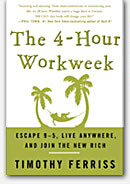Odd that it took them so long. Nick Carr has some sharp observations, plus a suggestion.
Yesterday, Facebook let it be known that it would launch a free classified-advertising service, which will compete with Craigslist. That’s a smart move. Facebook’s core users – college and high-school kids – are also big users of Craigslist. When Facebookers go off-network, Craigslist is probably one of their most likely destinations. So creating an in-network version of Craigslist will significantly expand Facebook’s control over its members’ online time. “We don’t try to lock people up or take more of their time,” Facebook founder Mark Zuckerberg fibs to the New York Times today. Then he tells the truth: “If we can provide people with efficient tools, they will use the site more.” Every page view Zuckerberg steals from Craigslist is money in his pocket.
But if Craigslist is a big draw for Facebook members, my guess is that Wikipedia is an even bigger draw. I’m too lazy to look for the stats, but Wikipedia must be at or near the top of the list of sites that Facebookers go to when they leave Facebook. To generalize: Facebook is the dorm; Wikipedia is the library; and Craigslist is the mall. One’s for socializing; one’s for studying; one’s for trading…



